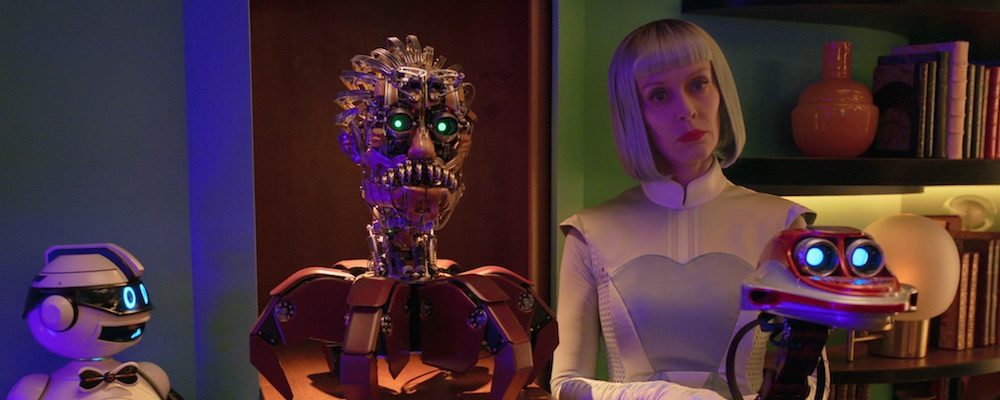Jean-Pierre Jeunet’s ‘Bigbug’ Pits Humans Against Appliances in Colorful Sci-Fi Satire
Alci Rengifo
With “Bigbug,” French auteur Jean-Pierre Jeunet jumps into the speculative bandwagon dominating modern science fiction. It’s all about the fear of the machines and the potential they may just turn on us. Unlike some of the more dreary visions of what artificial intelligence will wrought, Jeunet basks in his usual palette of vivacious colors and oddball comedy. Because this is a Netflix film, he’s also given few restraints. At times it harkens back to those early Jeunet films where his visual boldness was unafraid to combine with moments that could be slightly disturbing, mixing social commentary with scenes taken out of some strange dream, or hallucination.
It’s 2035 and in a futuristic suburb friends and lovers gather. The lineup is composed of Alice (Elsa Zylberstein), who is married to Victor (Youssef Hajdi) and has a teenage daughter, Nina (Marysole Fertard). Victor, however, has decided to be with his secretary, Jennifer (Claire Chust). Also at the house are Alice’s own new paramour, Max (Stéphane De Groodt) and his teen son Leo (Helie Thonnat). Serving their drinks and at the ready for any commands is android maid Monique (Claude Perron). She is just one of several other gadgets powered by artificial intelligence that linger around the house. Unbeknown to the guests, outside there are rumblings of an android rebellion led by armed androids known as Yonyx (all played by François Levantal), who began as mere service robots (who also run a vicious game show using humans as live entertainment). Then, the air conditioning in the house stops working and a built-in AI system locks all the doors. Nobody can walk out until given permission by the machines now attempting to take control of society.
“Bigbug” is Jeunet playing with an old plot device that has been used magnificently by master directors like Luis Bunuel in films like “The Exterminating Angel,” where elites are locked in together and all civilized codes of conduct begin to fall apart. Jeunet’s isn’t necessarily making a commentary on social classes but on the relationship between humans and machines. As a filmmaker Jeunet has always walked a fine line between visual boldness and acidic sensibilities. In the 1990s his reputation in the arthouse world was cemented by early films like “City of Lost Children” and “Delicatessen.” It was 2001’s “Amelie,” a breezy, visually joyful film about a Parisian woman trying to make the lives of everyone around her better, that became Jeunet’s biggest hit, scoring multiple Oscar nominations. “Bigbug” is a bridge between the commercial and the experimental. The set design has an unreal, almost sitcom ambiance. The digital work almost looks purposefully cartoonish, akin to the world created in the Wachowskis’ “Speed Racer.” The characters can be funny exaggerations of suburban stereotypes. Alice and Max can’t seem to find any privacy to have edgy sex while Jennifer cheerfully says she’ll vote for the proto-fascist, machine order being promoted on TV by Yonyx. Another guest, played by famous French actor Isabelle Nanty, has an android gigolo who recites poetry and has recorded all of their tenderest phrases.
After the doors are locked and the AI system in charge refuses to let anyone out, Jeunet never pushes the envelope too far and the biggest obstacle everyone seems to face is that it’s getting too hot inside the house. Many of the plot points develop as expected. Leo and Nina start to feel a mutual attraction while Victor tries to find a way to manipulate the machines into letting them out. More entertaining than the humans are the appliances. There’s a cute little robot that is meant to help you clean up, and a mustached head called Einstein that is meant to be supremely intelligent. When, led by Monique, the robots begin to scan the many books Alice keeps in the house, they begin to develop both a literary language and a more humanistic attitude. Once one of the threatening Yonyx androids makes his way to the house, Monique and her comrades offer up resistance as machines who have developed more of a consciousness along with a sense of solidarity.
Jeunet’s best moments in “Bigbug” are the ones where he takes a more upfront satirical approach. The Yonyx, with its glistening white teeth and demented smile, can not only issue you a ticket, but instantly extract the amount from your bank accounts. Everyone watches a show where humans are tortured and humiliated in what amounts to a futuristic Roman circus, convinced the participants are there willingly. Outside in a digital panorama that looks plucked out of one of Robert Rodriguez’s family movies, all seems deceptively quiet except for a roaming electronic advertisement that creepily peeks into your home, sensing you might need a new washing machine. These scenes are much more intriguing than the rest of the plot, which never gets pushed to any truly bold territory. Even when Alice tries to get Victor into some S&M foreplay, the scene is a chortle but not necessarily memorable. “Bigbug” has colors that pop and a cast that knows how to milk the humor with some energetic performances. For Jeunet it’s not a return to his glory days, yet it proves he still has an eye for material that at least has the merit of always feeling feisty.
“Bigbug” begins streaming Feb. 11 on Netflix.

